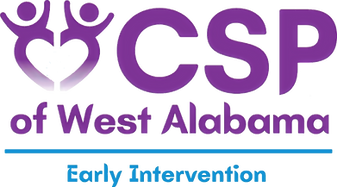
Early Intervention
The Early Intervention program is funded through the Alabama Department of Rehabilitative Services and the Alabama Department of Mental Health.
_edited.png)
Most children grow and learn at a similar pace. If a child is not developing at or about the same rate as other children, that child may be experiencing a developmental delay. Early intervention is a coordinated, family-focused system of resource access, supports and services for eligible infants and toddlers, ages birth to 3 years who have developmental delays or who are predisposed to developmental delays because of a medical diagnosis, i.e. spina bifida, cerebal palsey, etc. Early Intervention works to identify the special needs of a child and coordinates an individualized plan of services to meet those needs.
The Early Intervention program is funded through the Alabama Department of Rehabilitative Services and the Alabama Department of Mental Health.
Alabama Early intervention System (AEIS) is a statewide system that offers eligible families the opportunity to receive appropriate services, including assistive technology, audiology, family therapy, nursing, nutrition, occupational therapy, psychological services, service coordination, special instruction, social work, speech-language pathology, medical services, transportation, vision and health services, and physical therapy.

Evaluations & Eligibility
The following are used when determining a child's eligibility for services: a general developmental assessment of the child's abilities; a parental interview in which parents can voice concerns about their child's delay(s); a review of the child's health/medical records; assessments by specialists in the areas of concern.
A child who is not doing the following at the corresponding age, may have a developmental delay.
At the age of 3 months the child should:
-
babble
-
follow a moving object
-
hold his/her head erect
-
grasp object placed in his/her hand
All Early Intervention services and therapies are provided in the child's natural environment i.e., the child's home, daycare setting, etc. CSP's Early Intervention service coordinators will work with the family to determine the best setting. Family involvement is crucial to case management of these children.
If a child is eligible for Early Intervention services, an Individualized Family Service Plan (IFSP) is developed by the parents, the child's service coordinator and other service providers. An IFSP describes the services to be provided for a child including the frequency, time and location. The plan includes functional outcomes that will help a child reach full potential. The IFSP also plans for subsequent services, if needed, for when the child reaches age three.
Services and Costs
A network of professionals offer services at no cost to the family with some exceptions. Services may include:
-
Assistive Technology
-
Audiology
-
Family Training, Counseling and Home Visits
-
Health Services
-
Sign Language and Cued Language
-
Medical Services for Diagnostic Purposes
-
Nursing Services
-
Nutrition Services
-
Occupational Therapy
-
Speech-Language Pathology
-
Physical Therapy
-
Psychological Services
-
Service Coordination (Case Management)
-
Social Work Services
-
Special Instruction
-
Transportation and Related Costs
-
Vision Services
Research indicates that a child's most effective teachers are those with whom they have a nurturing relationship and with whom they spend the most time, such as parents, grandparents, or child care providers. How these individuals interact with the child while feeding, diapering, playing, and cuddling will have the greatest impact on how a child develops and learns. The team of early intervention professionals will aid and support the family while teaching skills that can be carried out on a daily basis in order to meet the child's developmental needs.
*Early Intervention offers service coordination in Bibb, Greene, Hale, Marengo, Pickens, Sumter and Tuscaloosa Counties.
